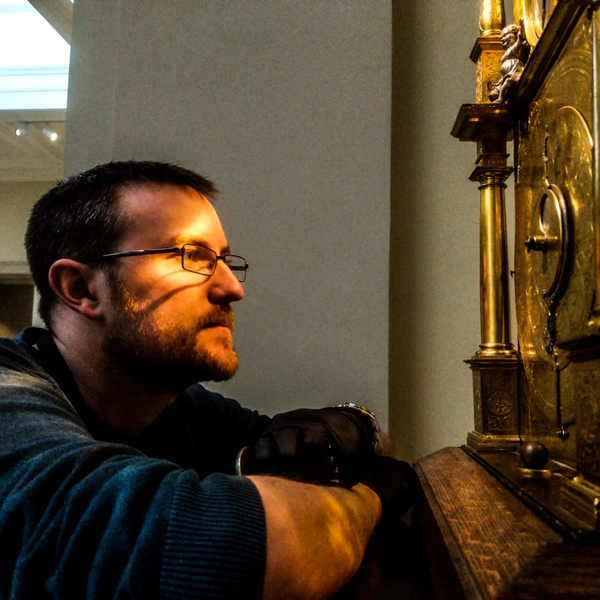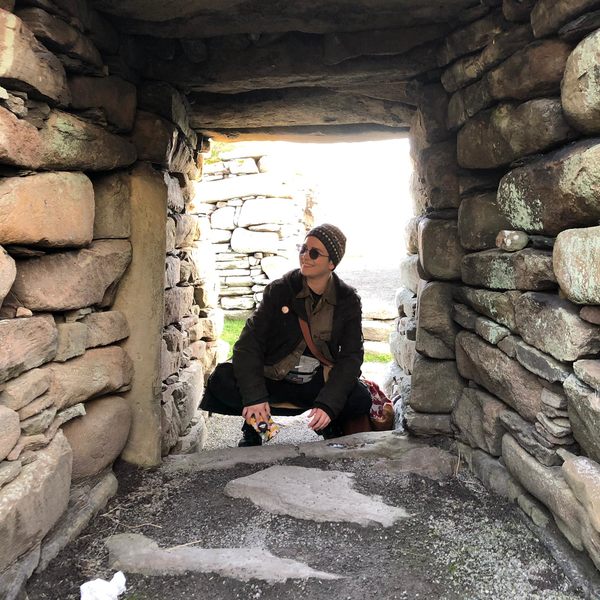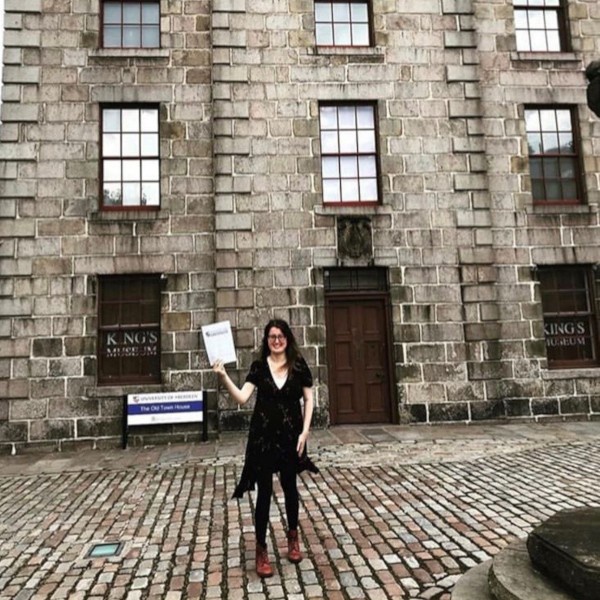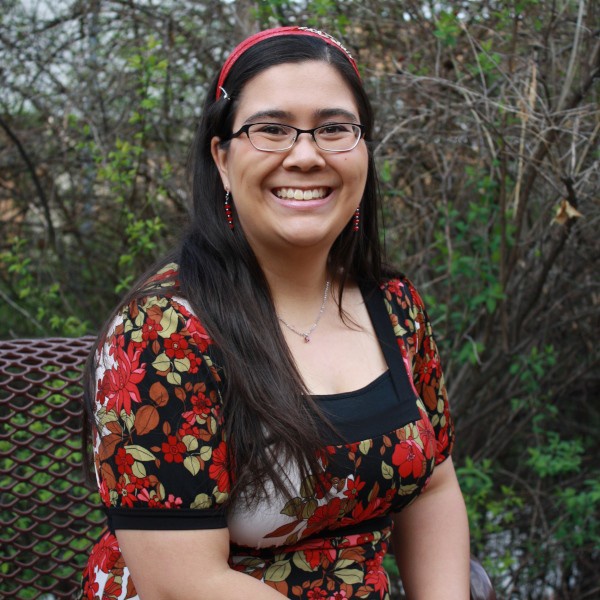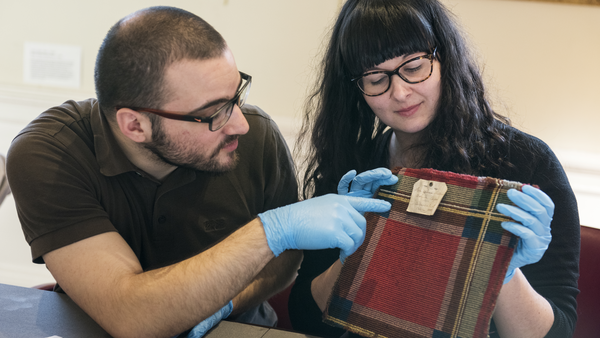
Introduction
The one-year Museum Studies master's programme draws on the University’s extensive museum collections to enable you to explore critical approaches to museum theory while also studying the application of museum practice and research at first hand.
This course has both January and September start dates. Apply Now
Eligible self-funded international Masters students will receive the Aberdeen Global Scholarship. Visit our Funding Database to find out more.
Study Information
Study Options
- Learning Mode
- On Campus Learning
- Degree Qualification
- MLitt
- Duration
- 12 months or 24 months
- Study Mode
- Full Time or Part Time
- Start Month
- September or January
- Location of Study
- Aberdeen
The University of Aberdeen’s museum collections are among the oldest, largest and most significant in the country, having the status of a Recognised Collection of National Significance. In fact, Aberdeen is one of the very few UK universities to have international-quality collections relating to the natural and cultural worlds.
The Museum Studies programme makes significant use of these collections to enable you to study the historical and contemporary roles of museums in society and develop skills in public engagement with research while gaining practical experience of museum work. You will gain foundational curatorial skills and an appreciation of contemporary issues museums face in the core courses: Researching Museum Collections, Museum Professional Practice, The Museum Idea, and Navigating the Museum Workplace. You can apply this knowledge in options like Museums and the Digital World, which involves designing a digital intervention for the University Museums and Special Collections, and Decolonising Museums, which tackles one of the most pressing issues facing the sector today.
During the summer you can choose Curating an Exhibition, which involves working with museum staff to design an online exhibition using the University collections, normally with linked display cases throughout campus and associated public outreach. You may prefer to research a topic in depth through writing a Museum Studies dissertation, a route recommended for those aiming to continue to the PhD in Museum Studies. There are many opportunities to work directly with the collections if this route appeals. Finally, the Museum Studies Placement allows students put their skills into practice by carrying out a project in a partner museum.
Our assessments involve skills you will utilise in a career in the heritage sector, for example, drafting mock grant applications, and putting together a career plan, as well as enhancing your skills in research and academic writing.
Available Programmes of Study
- MLitt
-
Museum Studies
Qualification Duration Learning Mode Study Mode Start Month LocationMLitt 12 months or 24 months On Campus Learning Full Time or Part Time September Aberdeen MoreMLitt 12 months On Campus Learning Full Time January Aberdeen More
We will endeavour to make all course options available; however, these may be subject to timetabling and other constraints. Please see our InfoHub pages for further information.
Fee Information
Additional Fee Information
- Fees for individual programmes can be viewed in the Programmes section above.
- In exceptional circumstances there may be additional fees associated with specialist courses, for example field trips. Any additional fees for a course can be found in our Catalogue of Courses.
- For more information about tuition fees for this programme, including payment plans and our refund policy, please visit our InfoHub Tuition Fees page.
International Applicants
Further Information about tuition fees and the cost of living in Aberdeen
Scholarships
Self-funded international students enrolling on postgraduate taught (PGT) programmes will receive one of our Aberdeen Global Scholarships, ranging from £3000 to £8,500, depending on your domicile country. Learn more about the Aberdeen Global Scholarships here.
To see our full range of scholarships, visit our Funding Database.
How You'll Study
An important feature of the Museum Studies programme is its extensive use of the University’s museums and collections and involvement of both academic staff in a range of related disciplines such as Anthropology, Archaeology, Education and Art History and the professional staff of the University’s museums. Teaching of the Museum Studies courses is in small groups, with one-to one supervision for the Project.
Learning Methods
- Field Trips
- Individual Projects
- Lectures
- Research
- Seminars
- Workshops
Assessment Methods
Assessments will combine practical skills and academic writing. These include developing a career portfolio, report writing, drafting mock grant applications, writing for a public audience etc. All the assignments are designed to provide students with experience of the kind of writing required for a career in the heritage sector.
Why Study Museum Studies?
- The Museum Studies programme is aimed at graduates in anthropology, archaeology, history and art history, and cultural and communication studies, but also attracts students from other disciplines who wish to develop expertise in public engagement with research and the cultural and heritage sectors.
- Teaching is delivered by practising museum professionals and academic specialists from Museum Studies, Anthropology, and Education. Guest lectures may be given by staff from disciplines including Archaeology, Law, Philosophy, and Art History, and from external colleagues based in a wide range of national and international museums.
- The University’s extensive museum collections are intimately linked with the University’s libraries and archives. The collections consist of European and Mediterranean Archaeology, Fine Art, Non-Western Archaeology and Ethnography, Numismatics, Scientific Instruments, Scottish History & Archaeology, Anatomy, Pathology and Forensic Medicine, Geology, Herbarium and Zoology.
- Across the University, there are several lecture and seminar series which you may find of interest, including those of Anthropology, Archaeology, Art History, Visual Culture and History, and the Museums and Special Collections evening lecture programme.
- You learn by applying your intellectual skills to live museum situations, providing you with a portfolio of experience along with your MLitt Museum Studies when you graduate. The programme thus brings together theoretical issues and professional expertise.
- You will learn how to interpret academic and specialist knowledge for a wide public: a skill needed by a variety of careers.
- You can customise your degree to specific areas of interest via our options in education, digital skills, and understanding decolonsation in the context of the museum sector. Furthermore, Curating an Exhibition allows you to take on a role in alignment with your professional goals; we offer a range of placement opportunities which vary year on year; and the dissertation allows you to expand on knowledge developed through the programme.
- Volunteering opportunities are often available for students wanting to engage with the University’s Museum collections.
Entry Requirements
Qualifications
The information below is provided as a guide only and does not guarantee entry to the University of Aberdeen.
Applicants for admission will normally be expected to hold a relevant Honours degree with a 2:1 standard from a recognised university or body in a relevant discipline, such as, but not limited to, anthropology, history, art history, media studies, cultural studies, digital heritage, archaeology, geography, environmental sciences, biology, ecology or science communication.
Applicants without this qualification may be admitted subject to having an alternative qualification, or an approved level of work experience appropriate to the field of study. Also taken into careful consideration is the trajectory of results, an applicant without an overall 2.1 but with 2.1 results in their final two years of study may be admitted.
Please enter your country to view country-specific entry requirements.
English Language Requirements
To study for a Postgraduate Taught degree at the University of Aberdeen it is essential that you can speak, understand, read, and write English fluently. The minimum requirements for this degree are as follows:
IELTS Academic:
OVERALL - 6.5 with: Listening - 5.5; Reading - 6.0; Speaking - 5.5; Writing - 6.0
TOEFL iBT:
OVERALL - 90 with: Listening - 17; Reading - 21; Speaking - 20; Writing - 21
PTE Academic:
OVERALL - 62 with: Listening - 59; Reading - 59; Speaking - 59; Writing - 59
Cambridge English B2 First, C1 Advanced or C2 Proficiency:
OVERALL - 176 with: Listening - 162; Reading - 169; Speaking - 162; Writing - 169
Read more about specific English Language requirements here.
Document Requirements
You will be required to supply the following documentation with your application as proof you meet the entry requirements of this degree programme. If you have not yet completed your current programme of study, then you can still apply and you can provide your Degree Certificate at a later date.
- Degree Certificate
- a degree certificate showing your qualifications
- Degree Transcript
- a full transcript showing all the subjects you studied and the marks you have achieved in your degree(s) (original & official English translation)
- Personal Statement
- a detailed personal statement explaining your motivation for this particular programme
- Reference x 2
- two reference letters, one of which should be from your university discussing your academic ability. If you have been out of education for a long time you may wish to use your current or most recent employers, or other professional individuals
International Applicants
Aberdeen Global Scholarship
Eligible self-funded post graduate taught (PGT) students will receive the Aberdeen Global Scholarship. Explore our Global Scholarships, including eligibility details, on our dedicated page.
Aberdeen Global ScholarshipsCareers
This degree provides suitable preparation for working in museums, galleries and heritage institutions, for those who wish to conduct further research in Museum Studies, and for an academic role in a variety of associated fields. It is also a valuable degree for those who are interested in developing ways of communicating academic work to the public.
Graduates of this programme have gone on to work at institutions including the British Museum, the Royal Collection Trust, the National Trust, Juneau Douglas City Museum and the Gordon Highlanders Museum, in the following areas:
- Collections Management
- Curatorship
- Exhibition Development
- Program Management
- Museum Research
The programme is geared towards both vocational study for work in the sector, and those wishing to pursue an academic career. It offers students the opportunity to engage in a number of transferable skills, such as project management, teamwork and research which are required across a broad range of roles and sectors.
What our Alumni Say
Our Experts
Information About Staff Changes
You will be taught by a range of experts including professors, lecturers, teaching fellows and postgraduate tutors. Staff changes will occur from time to time; please see our InfoHub pages for further information.
Facilities
As well as academic facilities, you will work within the University’s museums, including:
- Zoology Museum (worldwide in scope, from protozoa to the great whales, including taxidermy, skeletal material, study skins, fluid-preserved specimens and models.
- Museums Collections Centre (the location of most of the human culture collections).

Sir Duncan Rice Library
The University’s award winning Sir Duncan Rice Library is listed in the “Top 20 spellbinding University libraries in the World”. It contains over a million volumes, more than 300,000 e-books and 21,000 journals.
Find out more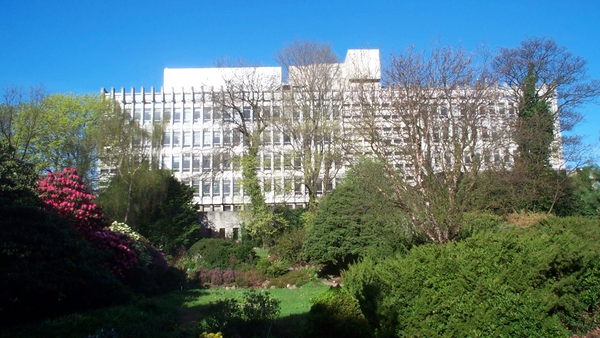
Zoology Museum
The museum’s displays are worldwide in scope, from protozoa to the great whales, including taxidermy, skeletal material, study skins, fluid-preserved specimens and models.
Get in Touch
Contact Details
- Address
-
Student Recruitment & Admissions
University of Aberdeen
University Office
Regent Walk
Aberdeen
AB24 3FX


